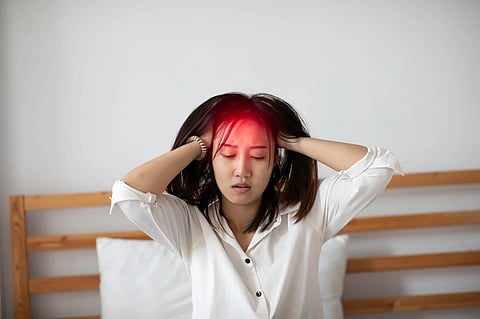
- Home
- Live Blog
- Breaking News
- Top Headlines
- Cities
- NE News
- Sentinel Media
- Sports
- Education
- Jobs

MUMBAI: If you’re prone to develop migraine headaches, you know how debilitating they can be. Even mild migraine symptoms can disrupt your entire day. “About 52% of visits to primary-care doctors are for headaches, the majority of which are likely migraine headaches,” says Dr. Julia Jones, a neurologist at Houston Methodist.
Migraine symptoms and severity can vary from person to person, but Dr. Jones has some universal migraine-prevention advice for anyone who experiences this type of headache: Know the common triggers and identify which most affects you.
Though genetics are thought to play a significant role, the underlying cause of migraines isn’t fully understood. Nor is the reason some people are more prone to developing them than others.
But Dr. Jones notes that we do know some brains are hardwired to tip into a headache.
“People prone to migraines have stronger functional connections between the autonomic nervous system and pain centers in the brain,” explains Dr. Jones. “A migraine headache likely happens as the result of a threshold effect, depending on the activity or excitability of a person’s brain.”
Dr. Jones adds that it doesn’t take a lot to send “a migraine brain” over the edge.
Knowing the common triggers of a migraine doesn’t guarantee you’ll never get one again. But for many people, it can help reduce the frequency of these headaches.
Here are six triggers of migraine headaches you may want to take steps to avoid:
1. Stress: Whether it’s due to issues in a relationship, work, your finances or something else, stress is a huge trigger for migraine headaches. “They can also be triggered by stress letdown, meaning when you’re finally relieved of a specific stressor in your life,” says Dr. Jones. “For instance, some people get a migraine headache every Saturday once the stress of the work week is over or on the first day of vacation.”
2. Hormone fluctuations: “For women, the estrogen withdrawal that occurs after your monthly period and after ovulation can trigger a migraine,” says Dr. Jones. In some cases, oral contraceptives can, too.
3. Changes to your routine: Even slight deviations in your day-to-day schedule, insignificant as they may seem, can have a big impact on a migraine brain.
“Mundane changes like being late for a meal or skipping one altogether can tip a person over the edge,” says Dr. Jones. “A variable sleep pattern can, too, which is most problematic for shift workers, such as nurses, bus drivers, police officers and more.”
Of note, Dr. Jones adds that more significant changes to your routine, like traveling to a different time zone, also can trigger a migraine.
4. Foods and drinks: “About a quarter of migraine patients will have a food or drink trigger,” says Dr. Jones. “We know that nitrites and tyramine-containing foods, specifically, can lead to these headaches.”
Foods and drinks known to trigger migraines include: Red wine, chocolate, cheeses, nuts, processed meats, smoked meats, dried fruits. Artificial seasonings and sweeteners (and any marinades they may be used in).
Migraine sufferers who think they may have a food trigger should consider keeping a food-symptom journal or using a migraine tracking app.
5. Odors and bright lights: Some migraine brains are more sensitive to strong sensory stimuli, including: Scented candles
Incense, Perfume, Smoke, Bright lights, Flashing lights, Fluorescent lighting.
“Remember, there is a threshold effect that we think is responsible for tipping a migraine brain over into a headache,” adds Dr. Jones. “Maybe you’re on your period, your routine is off and you didn’t sleep well. So, now all of the sudden a candle or scent that’s never bothered you before is leading to a migraine.”
In other words, keep in mind that these triggers can be cumulative.
6. Weather changes: Maybe you’ve heard that weather changes can lead to arthritis flare-ups, but they also seem to correlate with migraine frequency.
“Many of my patients will say that they know a cold front is coming before the weatherman,” adds Dr. Jones. (Agencies)
Also Read: Demand for generic medicines in India growing rapidly: Report
Also watch: